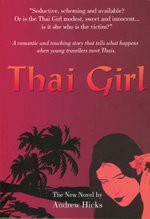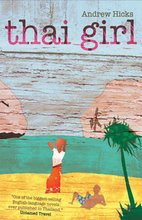
There goes the farang, they all say and look round at me and laugh. They say it without a hint of embarrassment, though they’re talking about me quite openly, me the foreigner, the towering alien, the outsider.
In the village I insist that I’m not to be called ‘the foreigner’. My name’s Andrew and it’s beginning to sink in that I’m a person, an individual and not just an exhibit, though sometimes it feels that’s all I am.
So how about this term, ‘farang’ that they always call us? You hear it everywhere. It’s the universal label pinned on foreigners of the Caucasian ilk, though it’s inclusive enough if you’re not too black and crinkly haired.
It’s said to be derived from ‘ferringhi’ , the Parsi for foreigner, the Persians having been among the early traders to settle at the ancient capital of Ayuttaya. Alternatively ‘farang’ comes from the Thai word for France which is ‘farangset’. Either way, as we’re all crudely lumped together as ‘farang’, the question is this… to what extent is ‘farang’ a term of abuse? Is the farang a friend or foe, a welcome and respected guest or like the Cantonese ‘gweilo’, a foreign devil intruding from an inferior and barbarous culture?
A quick answer is that it varies, depending on who’s using the term and its exact context, though that of course begs the question. Suffice it to say, it probably doesn’t sound as negative to the Thais as ‘foreigner’ or ‘alien’ does in English, but it can still be said with a sneer. On the other hand it sometimes suggests an exotic and prestigious personage with an admirably pallid face, a distinguished beak-like nose and a wondrously distended stomach and wallet. Yes, we do have a special status and regard in Thailand but I often wonder whether we entirely deserve it.
Bangkok’s world renowned ‘nightlife’ has tended to attract single male visitors who are not the most salubrious of our species. Should you chance to be there, in Pattaya, Patpong or Patong you’ll see these nocturnal beasts, shambling in flip flops and scruffy shorts, their tongues and entrails dragging along the broken pavements and they’re not a pretty sight. The Thais must despise them for everything except their dollars, though if the authorities encourage this style of tourism, then that’s the mangy dogs they’re sure to get.
Sometimes it’s worse than that and Thailand harbours mafiosi and criminals of all sorts… Pattaya especially is said to be a haven for them. So if these are among our ambassadors, it’s not surprising if the farang are not always admired by the peace loving Thais. As a people proud of their own cultural superiority, they may sometimes be negative towards outsiders, racist even, but in this instance it could be justified.
Nonetheless, the Thais’ ambivalent relationship with the outside world has a long history. From the Ayuttaya era and into the nineteenth century, the power, technology and toys of the western world had a fascination for kings and commoners alike. The elite promptly adopted western clothing, sent their sons to schools in England and bought trinkets such as clocks and cars, adopting a showy vulgarity that foreshadowed the materialism of today. At the same time they remain suspicious of the bigger fish in the global seas, concerned that the sharks would be irresistibly drawn to Siam’s unique tastiness.
Today they need massive inward investment but they’re troubled by the hold the foreigners then have over them. So they do it the Thai way! Let the foreigners in, take their money, smile and say yes to everything but keep moving the goal posts and changing the rules. Then you can have them in a permanent state of anxious anticipation and beholden to their hosts. That’s the Thai way to do it and it seems to work.
Yes, Thailand’s great quality has been to take what it wants without selling out too much of its own identity and independence; to run with the hares and to hunt with the hounds. In recent centuries, its leaders have watched for the winds of change and trimmed their sails skillfully to avoid foreign domination, playing off the rival colonial powers one against the other. Thailand thus avoided the indignity of being overrun by conceding rights of trade and extra-territorial jurisdiction to Great Britain in the Bowring treaty and handed over vast swathes of what are now Laos and Cambodia to the French. This was a society that was already ‘siwilai’, as the Thai term called it, and the intrusive civilizing mission of the western colonisers was thus avoided.
When during the Second World War the Japanese looked like becoming the dominant power in Asia, Thailand cozied up to the Rising Sun and declared war on the western allies. Then when the Japanese were defeated, she turned and fell ecstatically into the arms of Uncle Sam and has since done very nicely out of it. Massive foreign investment and globalization have changed Thailand irrevocably, but much still stays the same and Thais and foreigners remain very distinct one from the other.
I sense now that for these reasons and because Thailand has a cohesive and distinctive culture of its own, the Thais feel themselves to be set apart from the wider world, with a cultural superiority complex that is very different for example to attitudes in Malaysia or the Philippines. If the latter are more outward looking, more cosmopolitan and more sophisticated to a western eye, they may on the other hand retain less of their own cultural identity.
Put more negatively Thailand sometimes seems to be in a world of its own, introverted, out of touch, isolated even. Standards of education are poor on most objective assessments and for example English teachers sometimes can hardly speak a word of the language. Thais are reported to read a tiny fraction of what the Vietnamese read, preferring to enjoy their hammock and watch their own soap operas on TV.
If this apartness means they can better preserve their own Buddhist culture, so much the better, though having said that, it sometimes seems that nothing could be more destructive of Buddhist principles than the rush for militant materialism of the grossest kind. People seem to want rampant consumerism at any cost to the environment, their culture and themselves.
So where does that leave me, a farang living in Thailand? Is it a term of abuse, of superior distain or is it the opposite? Well, I can only conclude that I’ve always received an unqualified personal welcome wherever I’ve been in Thailand and sometimes to my embarrassment they treat me as a minor celebrity. I’m certainly not allowed to forget I’m a foreigner, though clearly it’s a good thing to be one.
Our village out in the rice growing province of Surin has about two thousand people and I’m the only resident farang. Few of my neighbours have ever seen a farang before, let alone got up so close and personal. When I first arrived some of the kids screamed and they all stared shamelessly. Does he smell, they wonder. Does he eat sticky rice? Why does he use a different sort of toilet? What’s it like being married to him? They certainly ask Cat some pretty direct questions.
Now after several years in the village I’ve made many good friends. It’s relaxed and easy and they call me Andrew, but nowhere is the welcome more warm than at the school. Cat and I are superstars there. Whenever we drop in, we’re taken into the staff room and sit and chat while the kiddies peep in through the windows. If there’s an event of some sort, we’re sat up at the front with the teachers and dignitaries and lunched and entertained most hospitably.
Most of all I’ve enjoyed their two day sports festival run in competition with the school in the next village. There were running races, sack races and a tug-of-war but by far the funniest was the football. It was viciously fought but with novel elements, indeed a totally new sport, a cross with water polo and mud wrestling. In each goal area was a deep swamp of muddy water, where the ball would fall dead giving both teams time to home in and wallow in glorious mud. With twenty one players crammed into the goal area wildly hacking at the ball in clouds of brown spray, it was truly hilarious.
All the while I was seated in a pitch side pavilion on a comfy sofa, a beer in hand as the teachers, kept up a running commentary into the microphone which became more uproarious as they emptied more bottles.
Soon it was time for the awards ceremony. The head presented some prizes, followed by a few local swells and then, half asleep, I heard my name being called.
‘Mister Andrew!’
Me? Present the prizes? Why me?
But then of course I should. I’m famous! Everyone knows my name. I’m a farang! Mister Andrew, their own tame, resident farang! Okay so I’ve swung in from another world, another planet and have a scary long nose, but being a ‘foreigner’ round here gives off no negative vibes whatsoever. Not that I’ve sensed anyway.





1 comment:
I'm just fallen by your blog and will be reading it with interest from now.
This post is old but struck an immediate chord with me! I'm new to Thailand and, although not the only farang in the village (like you), I too feel like a minor celebrity.
My gf and I have a son together who is luk kreung (half Thai) and boy does he get some attention, as do I. It's all fun and I have reluctantly begin to accept the term 'farang', like you I initially found it a little offensive but it's the Thai way. Once people begin to feel they know you it is soon 'Jon'.
This comment is way longer than I expected, see you around the blogosphere.
Post a Comment